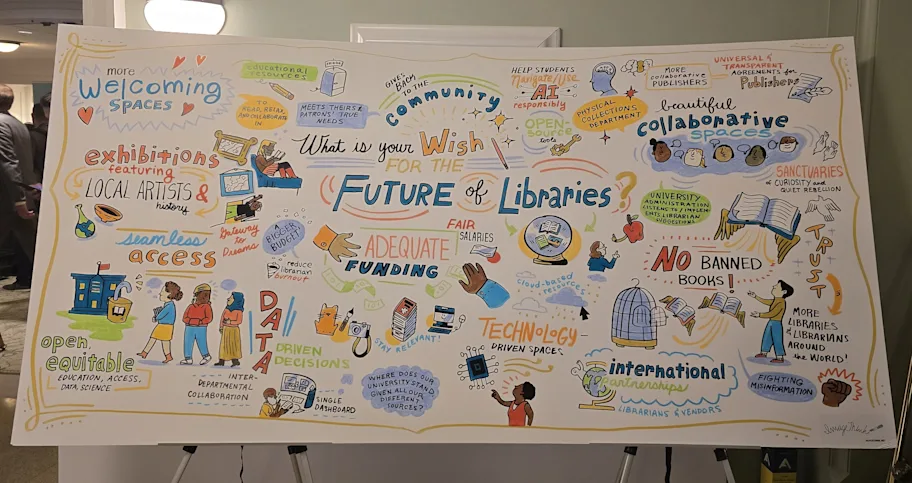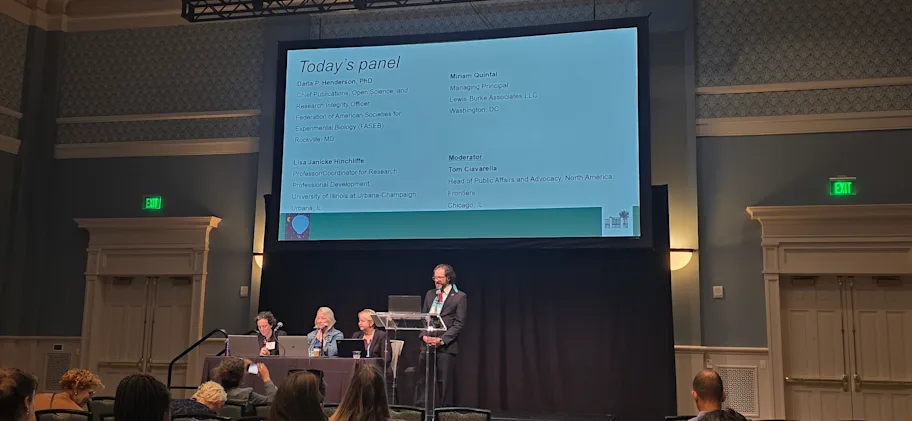
- Science News
- Institutional partnerships
- The evolving US publishing landscape in the era of open access
The evolving US publishing landscape in the era of open access

The 2024 Charleston Conference, with its theme ‘The Sky’s the Limit,’ provided an inspiring platform to explore pivotal themes shaping the future of academic publishing. This year’s focus on Library partnership ratings (LPRs), community-driven open access initiatives, and artificial intelligence felt particularly timely, with these topics underscoring the challenges and opportunities ahead as the publishing ecosystem adapts to new realities.
Library Partnership Ratings: transparency in a collaborative future
One of the key highlights of the conference was the discussion on Library Partnership Ratings (LPRs). Developed by innovative institutions such as Iowa State and UMass Amherst, LPRs play a crucial role in providing librarians with a transparent rubric for evaluating publishers and investments. This initiative is a significant step towards aligning publisher practices with library values, with a strong emphasis on equity, inclusion, and the sustainability of OA.
The introduction of LPRs marks a significant shift in the industry. Traditionally, collection decisions were made internally, guided by library policies and priorities. However, tools like LPRs now enable publishers to gain a better understanding of and respond to library needs. For OA publishers like Frontiers, this means demonstrating alignment with these values—whether through alternative OA models, support for non-APC initiatives, or robust, transparent publishing ethics.
As Erin Gallagher from the University of Florida noted, “We don’t just decide based on affordability; we consider values.” This sentiment echoes the growing emphasis on collaboration over transactions, making tools like LPRs an indispensable asset for nurturing meaningful publisher-library partnerships.
Scaling community-driven open access initiatives
The expansion of community-driven OA initiatives also took center stage. Discussions highlighted both the promise and the growing pains of scaling Diamond OA, particularly in the US . Unlike Gold OA, which relies on article processing charges (APCs), Diamond OA is funded through consortia, institutions, or community investment, making it more accessible for researchers but also more resource-intensive to sustain.
A session titled ’Mining for Diamonds: Challenges and Opportunities for US Non-APC Journals’ revealed stark challenges. With 69.2% of Diamond journals based in Humanities and Social Sciences (HSS) versus 30.7% in STEM, there is a clear gap in institutional and funding support across disciplines. Succession planning also remains a critical issue; these journals often rely on passionate individuals, risking burnout and discontinuity.
For publishers like Frontiers, this raises an important point: supporting STEM researchers through Gold OA does not detract from Diamond OA efforts but complements the broader goal of equitable access.
With our experience in co-developing partnership models tailored to the unique research and budgetary needs of diverse institutions, we have introduced a “transformed” institutional open access model—a transparent, fully open access flat fee approach—that redefines how institutions can transition to open access without reliance on paywalled subscription ‘big deals.’ This model empowers research libraries and institutions to provide their authors and researchers with unlimited open access publishing opportunities across all Frontiers journals. We believe that by fostering diverse OA models, publishers can play a key role in ensuring a sustainable future for all stakeholders.

Artificial intelligence and the future of open access
AI’s role in publishing, particularly in OA, sparked some of the most thought-provoking discussions at Charleston. Far from being a polarizing topic, the community’s approach to AI felt refreshingly pragmatic. With AI tools now ubiquitous in research and publishing workflows, the consensus is clear: the focus must shift to ethical and transparent use rather than avoidance.
The session ’Publishing Misconduct: How Does It Impact Librarians and the Library Community?’ tackled the nuances of AI’s implications. Libraries are grappling with disclosure policies, where researchers are required to identify AI-aided contributions to their work. This aligns with growing calls for transparency but raises questions about standardization and enforcement.
AI also intersects with broader issues like retractions. The academic community still views retractions as career-ending events, but as AI-related errors grow, there’s a need to contextualize and destigmatize honest mistakes. Publishers must lead this conversation by developing clearer policies and leveraging AI responsibly in peer review and editorial processes, something we also explored in the ’Enhancing global research through fully OA - maximizing AI and scholarly publishing synergies‘ session co-led by Frank Hellwig, Head of Institutional Market Strategy and Innovation, and Tom Ciavarella, our Public Affairs and Advocacy Lead.
Frontiers’ commitment to the research community is that we prioritize quality, because only high-quality, reliable research can inform decision-making by policymakers, practitioners, and the public, which is crucial to address global challenges
As Simone Ragavooloo, Frontiers’ Research Integrity Portfolio Manager states: “Research integrity is not just about conducting article level checks or investigating errors. It’s about setting higher standards in the scientific community and inspiring change. At Frontiers, our Research Integrity team is a beacon of trust and ethical practice. When our voice is trusted, our influence extends and becomes more powerful, guiding the actions of researchers, authors and the scientific community towards exemplary conduct.”
The publishing community must embrace AI as an enabler of efficiency and innovation while ensuring ethical safeguards. By collaborating on disclosure and usage standards, publishers and libraries can set a precedent for responsible AI integration.

Opportunities in a transforming landscape
The 2024 Charleston Conference framed how publishers, librarians, and institutions must align on shared goals to advance OA. For publishers operating in the US, several critical themes emerged. First, with the Nelson Memo and federal OA mandates potentially shifting, funding bodies may soon set their own OA policies. Publishers must proactively engage with these agencies to support sustainable OA funding models. As mentioned in the session ’Charleston goes to Washington,’ headed by Frontiers' Tom Ciavarella, in collaboration with Darla Henderson (FASEB), Lisa Janicke Hinchliffe (University of Illinois), and Miriam Quintal (Lewis-Burke), the industry is waiting to see whether Trump's OSTP will issue a new Nelson-like guidance immediately or if the 2013 public access policy (aka the Holdren Memo) is again actionable.
Secondly, despite OA’s growing adoption, misconceptions remain. Many librarians are still unfamiliar with Gold OA or unclear about the models specific publishers offer, such as our OA flat fee agreements. Clear, concise communication about OA frameworks and institutional benefits will be key to strengthening relationships.
Lastly, this year’s conference showed encouraging signs of convergence between librarian and publisher priorities. Sessions held by Frontiers were well attended, reflecting shared concerns about sustainability, transparency, and the future of OA.
Brian O’Connor, Global Sales Manager for Frontiers’ Institutional Partnerships and host of the session ’Open Science for a sustainable future - balancing access and quality through collaboration‘ remarked that: "The Charleston Conference was a testimony to the substantial conversations about open science that need to continue. Amid the inertia of legacy publishers, it’s crucial for libraries and consortia to steer the change towards a truly open and accessible research world."
As we look to the future, the sentiment shared during Charleston rings true: collaboration is not just the best path forward - it’s the only path forward. The publishing landscape is evolving rapidly, and by working together, we can ensure that the sky’s the limit for equitable, accessible, and impactful scholarship.
“This year’s conference motto was ‘The Sky’s the Limit,’ said Sales Specialist and third-time attendee Erin Upshaw, “which aptly indicates the growing fellowship between librarians and publishers. As we start having the same conversations and coming to the same table, I truly feel like we’re all heading for something great.”
As the conversations from the Charleston Conference continue to shape the future of academic publishing, we’re excited to bring these discussions online from December 9–13. This virtual extension offers all the in-person content from the conference plus exclusive online-only sessions designed to foster deeper engagement and dialogue. Notably, we’re hosting a Library Services session titled Incubating Talent: Supporting and Training Student Editors with Laura Henderson, Head of Program for Frontiers for Young Minds, on 9 December 2024.
We look forward to engaging with the global community during this dynamic online event and continuing the momentum toward a more open, collaborative future for academic communication.
About Frontiers
Frontiers is a leading research publisher. Our role is to provide the world’s scientists with a rigorous and efficient publishing experience. Powered by custom-built technology, artificial intelligence, and a collaborative peer review, our community journals give experts in more than 1,800 academic fields an open access platform to publish high quality, high impact research. For more information on Frontiers’ OA agreements please fill in this form.






